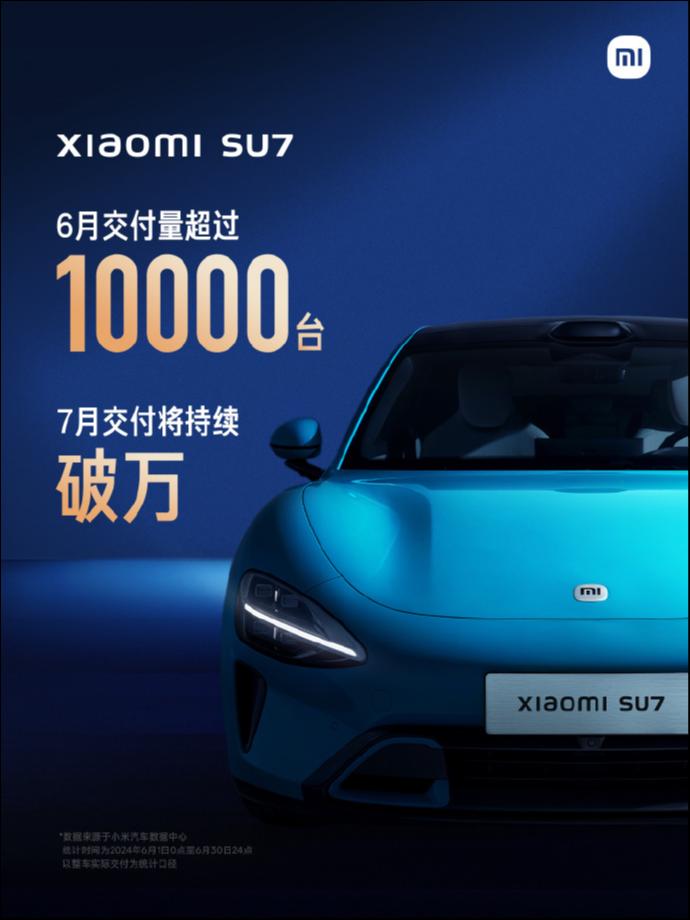Xiaomi Auto Delivery First Tops 10,000 Units in a Month
TMTPost -- Xiaomi Corporation is doubling down electric vehicle (EV) delivery to catch up with domestic peers among intense competition in their homeland China.
Credit:Xiaomi
The delivery of Xiaomi‘s first first EV model SU7 in June topped 10,000, according to a post of the company’s auto unit on Chinese social media platform Weibo earlier this week. The monthly delivery for the first time exceeded the 10,000-unit mark, achieving a new milestone of delivery since the model officially launched late March. Xiaomi added the shipment in July is expected to more than 10,000 vehicles too.
In a post on Weibo Tuesday, Xiaomi updated its devliery development. It said its work to accelerate delivery of SU7 is well on the way as the facility has initiated two-shift production in June. Starting from July 1, the delivery of SU7 series will be further accelerated, and the delivery cycle is expected to be shortened by up to 5 weeks after the order is locked in, Xiaomi said. At the same time, the company will carry out a new round of production line optimization and maintenance in the near future to prepare for further improvement of production capacity. It stressed such optimization and maintenance will not have any impact on the delivery target of more than 10,000 units in July.
The monthly result is the latest sign that Xiaomi is stepping up output and delivery of SU7. Xiaomi said nearly three weeks ago that the accumulative delivery of the model has topped 20,000 units as of June 13, suggesting it delivered around 5,000 SU7 vehicles in two weeks. The company just announced at the beginning of June that delivered 8,630 SU7 vehicles in May, accounting for 57.5% of the total delivery of more than 150,000 units since launch late March.
Xiaomi officially launched SU7 on March 28, with starting price cheaper than its major competitor: Tesla’s affordable Model 3. Xiaomi co-founder and CEO Lei Jun presented late March that SU7 has a layered pricing since it has three variants. The standard SU7 costs RMB215,900 (US$29,872), and the Pro and Max version are priced at RMB245,900 and RMB299,000, respectively. Lei said the SU7 is RMB30,000 cheaper than Model 3, which starts at RMB245,900 in China.
Xiaomi started presales for SU7 on the day of launch and offered a hand of freebies worth of up to RMB22,000, such as Nappa leather seats and a built-in fridge, to anyone who place the order of the Standard and the Pro version by April 30. The company disclosed at Weibo that it received more than 10,000 preorders in just four minutes since the launch, and preorders topped 50,000 within 27 minutes. These preorders come from customers who had paid a deposit of RMB5,000 that is refundable within seven days since the order is effective.
At the investor day, Lei revealed Xiaomi aims to deliver 100,000 units in April. The annual delivery target represents an average of 12,500 cars per month from April to December. It suggested Xiaomi has hiked its target by nearly 40% as Lei said his company originally set the target of 72,000 units and his own sales target was 10,000 units per month. Xiaomi’s reiteration of the target and signal of up to 120,000 units it is working for highlighted the company is striving for a significant presence amid the cut-throat competition in the Chinese EV market.
Xiaomi reiterated the annual target last month. “Our monthly delivery for June will exceed 10,000 units and we will guarantee the delivery of 100,000 vehicles for the whole year while striving to reach 200,000 units,” Xiaomi’s auto unit said in the post on Weibo on June 14.
Disclaimer: Investing carries risk. This is not financial advice. The above content should not be regarded as an offer, recommendation, or solicitation on acquiring or disposing of any financial products, any associated discussions, comments, or posts by author or other users should not be considered as such either. It is solely for general information purpose only, which does not consider your own investment objectives, financial situations or needs. TTM assumes no responsibility or warranty for the accuracy and completeness of the information, investors should do their own research and may seek professional advice before investing.


